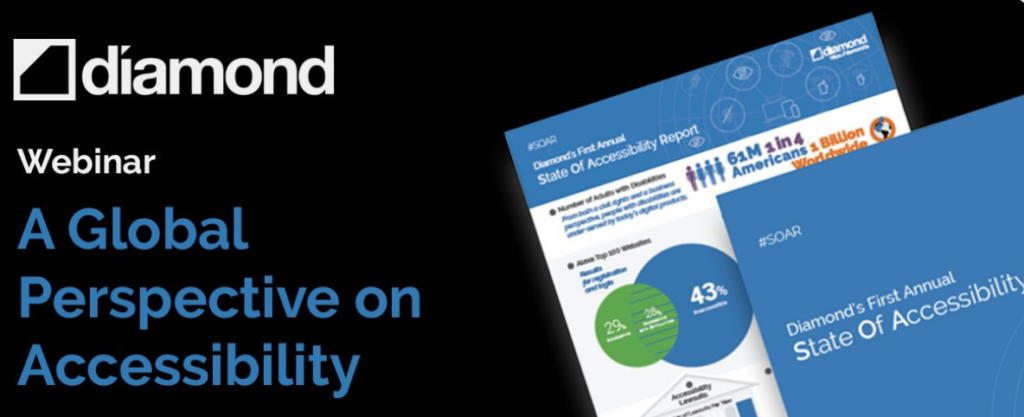M+E Connections

Diamond: Global Digital Accessibility Challenges Remain
Story Highlights
Despite the strides that have been made in recent years, various digital and other accessibility challenges remain all around the world that are making it harder for many people – including those who are blind, deaf or have other handicaps – to communicate with other people and get the information and services that they need, according to accessibility experts.
And some of those challenges have become even more pronounced since the start of the COVID-19 pandemic, they pointed out April 16 during Diamond’s webinar “A Global Perspective on Regional Accessibility.”
“It’s been an extremely lonely journey” for Irene Mbari-Kirika, executive director of non-profit organization inABLE, over the past 13 years or so because “accessibility is a very, very foreign concept” to people in Kenya, Africa, she told viewers.
“There’s definitely a need for a lot of training and education” there, she said, noting that the Kenyan government has “moved a lot of services online,” but there are no laws on digital accessibility there.
COVID-19 has “created an opportunity and an entry point for us to have these conversations” there because the government tells everybody to go online for services, but
mobile apps and websites are typically not accessible to people with disabilities, she said.
People with disabilities are also experiencing a “secondary source of isolation” through this pandemic – “digital isolation”—because many of them are not able to access many mobile applications, connectivity is very expensive there, and many people in Africa don’t have laptops or smartphones, just feature phones, she explained.
On top of it all, the face masks that are being used are creating a challenge for those in Kenya who are deaf or hard of hearing because many of those people rely on lip reading, she pointed out.
 Moderator Joe Devon, Diamond co-founder and also co-founder of Global Accessibility Awareness Day, pointed to one solution to that latter dilemma he read a news story about in which a high school student started making 3D-printed face masks with plastic over the mouth that allow lip reading.
Moderator Joe Devon, Diamond co-founder and also co-founder of Global Accessibility Awareness Day, pointed to one solution to that latter dilemma he read a news story about in which a high school student started making 3D-printed face masks with plastic over the mouth that allow lip reading.
Devon also led off the discussion by noting that, in the U.S., the FCC requires closed captions on all broadcast networks and, at least in California, whenever local mayors and the governor speak publicly, there is always an interpreter on hand.
One challenge in Japan, however, is that there is no “legal pressure to make things more accessible,” according to web accessibility consultant Makoto Ueki. “We haven’t seen any big changes in the last four years,” he said.
But Ueki pointed to a technological solution that seems to be helping those with disabilities: a voice recognition and translation application that works “in combination with Zoom, which works very well for captioning,” he said.
“The fact that you can loop in the live captioning is really a big deal,” Devon agreed. He also pointed out: “A lot of people are attacking Zoom for its security issues and what really happened is that Zoom, when they were building [it, they] had to weigh and balance” whether to focus on security or ease of use – “and they optimized for ease of use by far.” Zoom’s creators “definitely made some mistakes, but [it’s] getting better,” he said.
Patrick Dunphy, digital accessibility program manager at CBC/Radio-Canada, pointed out that his entire department has been working from home since March 13. “What’s interesting is that we have programs for radio and television being produced from peoples’ homes, which is very unusual” for his organization, “but extreme situations call for extreme measures,” he said.
“COVID definitely threw a wrench into things,” Dunphy told viewers. Agreeing with him was Charlii Parker, digital accessibility consultant at non-profit organization Vision Australia, who noted that her digital access team had planned to hold a birthday party to celebrate its 20th anniversary, but had to scrap that plan as a result of the pandemic.
The Australian government’s new National Disability Insurance Scheme has “pushed disability into the spotlight,” she went on to tell viewers. However, there is “still a long way to go” when it comes to solving all accessibility challenges that the disabled face in her country, she said.
“There are a lot of people out there who are wanting to do the right thing, but not sure how,” she said. That is especially true at the moment when it comes to “the work that we do with auditing websites and helping people get their digital platforms accessible,” she said, noting: “We are extremely busy at the moment, which tells me that it is important.”
In comparison, “when I first started in this industry it was a bit of a checkbox exercise” in which an organization would say: “We want to be AA. Tell me what we need to do to be AA,” she said, referring to the Australian government’s WCAG 2.0 Level AA guidelines. That was without them having “any real understanding of what that was,” she noted.
However, “now, people are becoming more aware,” she said, adding: “People with a disability are advocating for themselves a lot more. We have had a couple of large actions against different companies over their accessibility, so that has brought it into the spotlight as well. We still have a ways to go. But people are getting more of a voice.”
She often speaks to organizations about the needs of people with accessibility issues and how “people with a disability have the same wants and needs as everybody else,” she noted. “Just because somebody has a disability doesn’t mean that they don’t want to do all the same things that everybody else wants to do online. And then, once those things are accessible it actually makes it easier for everyone. And that message is coming through,” she said.
She also stressed the importance of speaking to people with disabilities to see what they want before building something for them because people may have the same condition as others, but their experiences online are often different and the way they have their computers set up are different.









